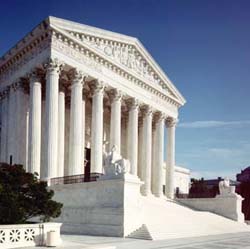Natural Law and the US Supreme Court
 I just read a fascinating article at Touchstone, "A journal of Mere Christianity," that asks why 5 of the 9 US Supreme Court Justices are Catholics, all appointed in the last 20 years, on a court that has been historically dominated by "Mainline" Protestants, including only 7 other Catholics in the last 200 years.
I just read a fascinating article at Touchstone, "A journal of Mere Christianity," that asks why 5 of the 9 US Supreme Court Justices are Catholics, all appointed in the last 20 years, on a court that has been historically dominated by "Mainline" Protestants, including only 7 other Catholics in the last 200 years.The reason for this that is offered: Catholic teachings on Natural Law are more acceptable to both "secularists" and "spiritualists," the two dominant schools of legal theory in our culture, than either group's ideology would be to the other. Catholic understandings of natural law are also consistent with American philosophical traditions: the Declaration of Indepence makes an argument based entirely upon natural law, "the laws of nature and nature's God," because this was the understanding shared by Deists and Calvinists the dominant schools of thought at that time. If the author (an Evangelical Protestant) is right (and I believe he may be), then this new trend toward a new emphasis upon natural law is a very good sign for our society.
Natural law assumes a theistic basis for national morality and principles of justice. The only basis available to a secular democracy is the fickle will of the majority. The majority-will defines what is right and wrong for such a nation. All laws would be "just" in a God-less democracy, so long as they were legitimately the will of the majority. But history demonstrates that the majority can be wrong, as in Nazi Germany for example. There must be a higher standard.
Labels: Political Philosophy









1 Comments:
Great post - very enlightening, thanks
Post a Comment
<< Home